

Substance Use Resources - Legal Action CenterLegal Action Center. Substance Abuse Treatment and Family Therapy - NCBI Bookshelf. "Drugs, Brains, and Behavior - The Science of Addiction" Skip to main content En español Home » Publications » Drugs, Brains, and Behavior: The Science of Addiction » Preface Drugs, Brains, and Behavior: The Science of Addiction Preface How Science Has Revolutionized the Understanding of Drug Addiction For much of the past century, scientists studying drugs and drug use labored in the shadows of powerful myths and misconceptions about the nature of addiction.
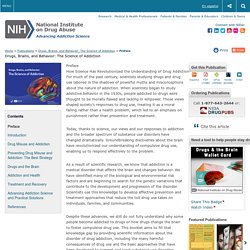
Today, thanks to science, our views and our responses to addiction and the broader spectrum of substance use disorders have changed dramatically. As a result of scientific research, we know that addiction is a medical disorder that affects the brain and changes behavior. Despite these advances, we still do not fully understand why some people become addicted to drugs or how drugs change the brain to foster compulsive drug use.
Nora D. Prev Index Next This page was last updated July 2018 Contents Get this Publication Ordering Publications Call 1-877-643-2644 or: Cite this article. Codependency: Addicted to an Addict. Frequently people who seek out this type of relationship do so because they have had similar experiences in their past.
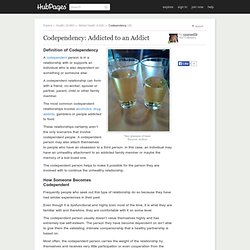
Even though it is dysfunctional and highly toxic most of the time, it is what they are familiar with and therefore, they are comfortable with it on some level. The codependent person usually doesn’t value themselves highly and has extremely low self-esteem. The person they have become dependent on isn’t able to give them the validating, intimate companionship that a healthy partnership is based on.
Most often, the codependent person carries the weight of the relationship by themselves and receives very little participation or even cooperation from the individual they are attached to. How to Create Boundaries With Adult Children in Recovery. Sober and Shameless. I posted on FB back in June about helping a drunk women outside a meeting I attended.

This is the post: Tonight, I helped a drunk homeless woman get to the ER and off the cold street. She was outside a meeting; body shaking, tears rolling down her face, her belongings stuffed in a bag, completely alone, with no where to go. Wow, brings back terrible memories. I am grateful tonight, as a climb into my warm bed, so very grateful. The post on FB received great attention and many people commented and emailed me about the post and the extraordinary lengths I went to help her. Over whelmed by the response I posted again. You all give me way to much credit. Sober and Shameless, but not nice, Kw I have been thinking about the posts and the response that I continue to receive. In my addiction, I was raped and beaten in a dark alley, in the late hours of the near freezing night. No one did. I have never forgotten that night, of course, not the rape.
This is why I helped that women that night. Helping People Change. What Families Can Do to Make or Break Denial by David Mee-Lee, M.D.
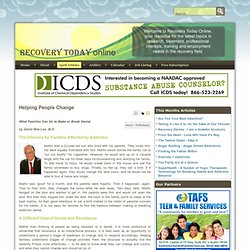
The Dilemma for Families Affected by Addiction Martin was a 22-year-old son who lived with his parents. They loved him, but were equally frustrated with him. Martin would borrow the family car to “run out briefly” for cigarettes. Martin was “good” for a month, and the parents were hopeful. A Different View of Denial and Resistance Rather than thinking of people as being resistant or in denial, it is more productive to remember that resistance is an interactional process.
Understanding Stages of Change in Families. Family And Life Advice Articles. Substance Use Disorders and Vocational Rehabilitation Implications. Technical Assistance Brief (2011) Introduction This Technical Assistance Brief on substance use disorders is intended to: provide a clear, detailed understanding of the disability; describe the implications for the vocational rehabilitation process and approaches that are aligned with current evidence-based or consensus practices and recovery-based principles; and, identify useful specialized resources.
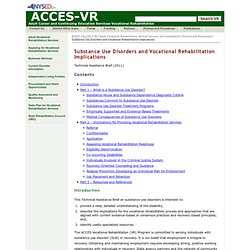
The ACCES Vocational Rehabilitation (VR) Program is committed to serving individuals with substance use disorder (SUD) in recovery. It is our belief that employment is integral to recovery. Codépendance. Codépendance. How to Create Boundaries With Adult Children in Recovery. Living with a Drug Addict: Holding the Line Also Means Letting Go. « return to blog home Living with a Drug Addict: Holding the Line Also Means Letting Go Tuesday, June 8th, 2010 The Partnership is excited to welcome new blogger Bill Ford to the Intervene community!
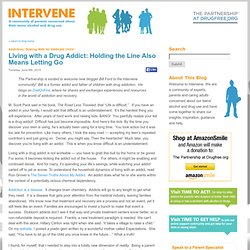
Bill is a former addict and father of children with drug addiction. He blogs on DadOnFire, where he shares and exchanges experiences and resources in the world of addiction and recovery. M. Living with a drug addict is not workable — you have to grab this bull by the horns or be gored. Addiction is a disease. Eventually, we act, for better or worse, but don’t let this disease take you down. Related Links:Time To Get Help 9 Steps to Take When Your Recovering Teen Comes Home from TreatmentYour Teen Drug Addict on the Fringe Posted by Bill Ford | Filed under Addiction, Dealing with an Addicted Child.
The Impaired Nurse: Costs of Substance Abuse. The Partnership for a Drug-Free America™ Support and Resources for Parents Dealing with Teen Drug and Alcohol Abuse. Addictions and Recovery.org - Relapse Prevention and Coping Skills. Addiction Caregiving - Addiction Center.